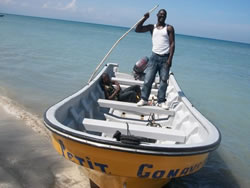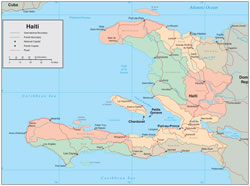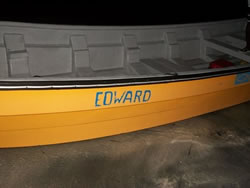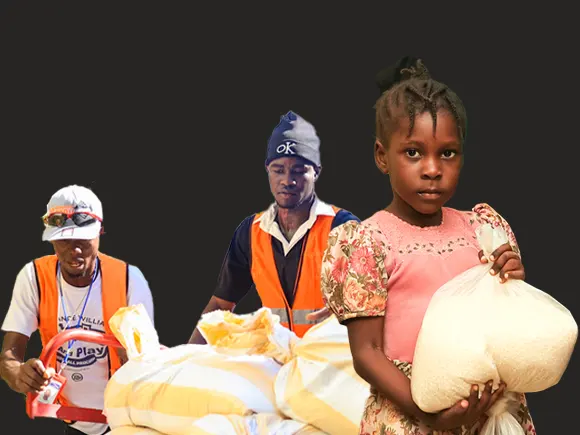Haitian Man turns Fishing Boat into a Lifeboat
COCONUT CREEK, Fla. (March 4, 2011) –Imagine this scenario – it’s the dead of night, you’re in a tiny fishing boat, your body is rebelling against you due to the symptoms of cholera, and your only chance for survival is a three-hour ride in the rough waters from a small island to the mainland.
 | |
Saul Ancelo, 35, used a fishing boat donated by FFP to transport 42 cholera victims for medical treatment. | |
This is what it was like for 42 men, women and children during the onset of the cholera outbreak in Haiti. The outbreak started last October in the Artibonite region, and when reports of cholera reached the international airwaves, fear of it spreading to the tent cities focused attention on the capital of Port-au-Prince. More than a million people left homeless by the magnitude 7.0 earthquake were now in the line of fire of this waterborne illness, which can kill a person within hours if left untreated.
However, it was the residents on the small island of Ile de la Gonâve, located in the waters in the cradle of Haiti, who were sick and suffering at the start of the outbreak. Because no medical treatment was available, and no one even knew the cholera had spread beyond the mainland, the situation on the island was beyond critical.
But out of the darkest tragedies, man-made or natural, stories of triumph sometimes come to light. One of those stories is that of Saul Ancelo, who was born and raised on Ile de la Gonâve in Chardonet, a dot of a town not that far from the tiny island of Petite Gonâve, which is between Ile de la Gonâve and Leogane on the mainland. Ancelo is 35, and still calls Chardonet home with his wife and two children. A fisherman by trade, he had no idea that he would literally become a fisher of men.
“So many people were getting sick, and so fast. Many didn’t know what was happening or even how to stop it. There were stories of those with cholera being abandoned by their families and left to die on Ile de la Gonâve because they were afraid of getting sick,” said Ancelo, through a translator.
 | |
Ancelo transported 42 cholera victims from the island of Ile de la Gonâve to Leogane on the mainland. | |
Putting his livelihood and even his life on the line, Ancelo took it upon himself to use a yellow motorized fishing boat, donated to the fishing village La Gonâve on Petite Gonâve to rescue the cholera victims. There are currently 33 active fishing villages in cities and towns along the coastal regions of Haiti, including the one on the tiny island. These villages, funded through donations, and built by Food For The Poor, provide deep-sea fishing for food and income for fishermen like Ancelo and residents in neighboring communities.
Armed only with a fishing boat and sheer determination, Ancelo transported the sick and those on the edge of dying across the waters to Leogane. He made more than two dozen trips back and forth sometimes with several patients onboard the boat named “Edward.” He even made crossings at night in the rough waters, which was an extremely dangerous journey.
“This is not a man of means, the little money he had, he spent it all to buy fuel and the oil needed to power the motorboat to ferry people to and from mainland Haiti to get medical treatment,” said Robin Mahfood , CEO/President of Food For The Poor. “Saul is a real-life hero, he truly is. Because of his bravery lives were saved, and only God knows what would have happened to the population on Ile de la Gonâve if he didn’t act.”
Because this life threatening disease is no longer being captured by the cameras of the media doesn’t mean it’s gone away. To date, since the outbreak, more than 4,500 people have died, more than 230,000 have been reported sick, and according to the United Nations the death rate in rural areas remains alarmingly high.
With these statistics, one doesn’t have to be a medical expert to understand that a clean water source and a home with adequate sanitation are life-saving necessities. Since the cholera outbreak, Food For The Poor has installed 30 solar-powered water filtration units in the Artibonite region, with the help of Water Missions International. Since last year’s earthquake, the charity has built nearly 1,900 homes with sanitation units in Haiti, more than 300 of these since the new year.
 | |
The boat Ancelo used to make more than | |
“The best way to combat cholera or any form of pestilence is to get the people left homeless by that devastating quake out of the tents and into permanent houses,” said Mahfood. “Cholera is a terrible disease that causes its victims to have uncontrollable diarrhea, vomiting, and dehydration. It can be deadly, so we’re going to do all that we can to try to stop it.”
Ancelo’s acts of kindness didn’t end with the initial boat rides. Once the residents of Ile de la Gonâve received medical treatment and recovered from their bout with cholera, Ancelo ferried them back to their home on the island. Miraculously, all 42 survived, and after staring death in the face – they will live to tell the story of how a man on a fishing boat helped to give them a second chance at life.
Food For The Poor, the third-largest international relief and development organization in the nation, does much more than feed millions of hungry poor in 17 countries of the Caribbean and Latin America. This interdenominational Christian agency provides emergency relief assistance, clean water, medicines, educational materials, homes, support for orphans and the aged, skills training and micro-enterprise development assistance, with more than 96 percent of all donations going directly to programs that help the poor.
For more information, please visit www.FoodForThePoor.org.
Contact:
Wanda Wright
Food For The Poor
Public Relations
954-427-2222 x 6079
wandaw@foodforthepoor.com
